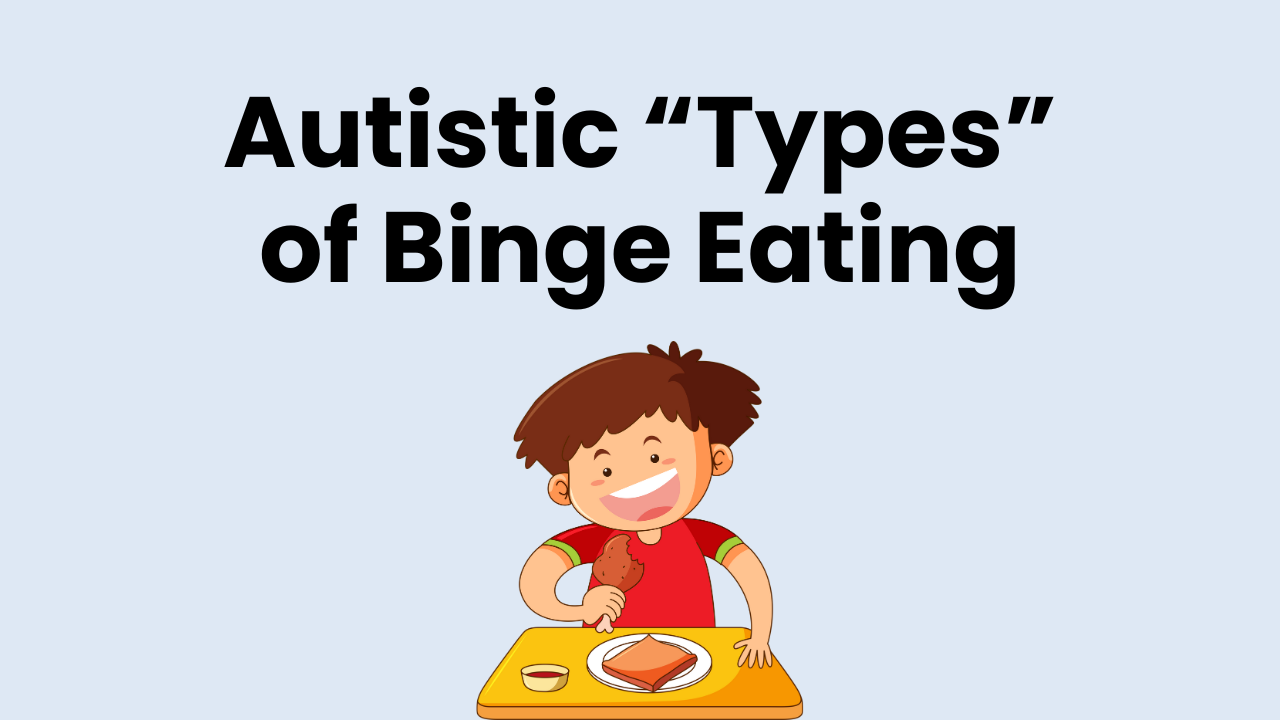Autistic Types of Binge Eating
Sep 06, 2023
👉 Listen to the podcast version here 👈
Autism and disordered eating often go hand-in-hand. From my personal experience as well as working with hundreds of autistic individuals and their parents, I have become all too aware of the fact that food-related manifestations of autistic traits know no restrictions! In this post, I will be explaining the relationship between autism and binge eating. More specifically, you’ll learn to distinguish between 9 different “types” of bingeing as a result of autistic traits.
1. The Sensory Binge
First up, the sensory binge! Eating is one of the most all-encompassing sensory experiences in (no pun intended) that it provokes practically every sense. Not just the 5 well-known senses including sight, taste, touch, smell, and hearing (ya know, food ASMR and all that), but it also triggers internal feelings relating to interoception.
2. The Hyperactive Binge
When it comes to triggering our internal senses, food has a major impact on our nervous system. When we are feeling hyperactive, jumpy, and in a state of fight-or-flight mode, food can be soothing and help bring us back into a state of calm. Especially if you have a history of restriction, eating may help your nervous system perceive safety.
3. The Black & White Binge
Autistic people often have polarized ways of thinking, either going “all in” or “not at all.” This can apply to all areas of life including school, work, friendships, projects, etc, but also when it comes to food. We can get caught up in either being super “healthy” and dieting or taking on the “f*ck it” attitude and then bingeing because you believe you’ve already “screwed up,” so you might as well keep going.
4. The “Make Sense” Binge
A huge part of my own eating disorder was this mental idea of food needing to “make sense.” Although that sounds vague when spoken about objectively, the subjective experience of things needing to “make sense” is a very common autistic trait. In bingeing this can present as the food needing to have a certain “look” after eating it (cake being perfectly cut, peanut butter being perfectly smoothed out, needing to eat the entire row or column of chocolate, etc). The drive for the food being left “perfectly” can cause you to eat until it’s all gone, or at least eat more than you initially wanted.
5. The Analysis Paralysis Binge
When I feel anxious and have lots of different foods in the house, I sometimes have a hard time deciding what to make or eat. Thinking about all my options can cause me to become “paralyzed.” Because I can’t pick one option, I will eat everything.
6. The Procrastination Binge
Food can be an escape. When we have a lot on our plates (no pun intended) in our lives, the sensory experience of bingeing can temporarily numb us from the stress of tasks or responsibilities.
7. The Interoceptive Binge
Interoception is the sense through which we monitor the inner state of our body. It helps you understand your internal cues, including whether you’re hungry, thirsty, tired, energetic, too hot, too cold, etc. Autistic people tend to lack interoceptive awareness, meaning we may be unable to recognize feelings of hunger and fullness in the same way neurotypicals do. For this reason, we may go very long without eating, which then leads to bingeing. Difficulty sensing fullness can contribute to eating excessive amounts of food during the bingeing itself.
8. The Hormonal Binge
I myself have PMDD, which stands for Premenstrual Dysphoric Disorder and is considered a severe form of PMS. It’s incredibly common among autistic people and seems to be the result of an extreme sensitivity to hormonal changes throughout the month. During my “PMDD week,” I get very depressed and all I want to do is binge. But people who don’t get periods may also struggle with binge urges due to hormonal fluctuations.
9. The Extreme Hunger Binge
When you have restricted yourself of food for a prolonged period of time (there are several ways beyond simply eating too little calories), your body builds up an energy deficit. The longer you restrict, the more food you’ll eventually need to eat to bring your body back to a place of energy balance. When you experience extreme hunger, you will eat very large quantities of high-calorie food as your body repairs the damage done due to restriction.
Do you want to stop bingeing and discover your unique version of normal eating? Schedule a consultation call for 1-1 coaching here!


